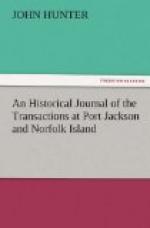Ans. Yes: some bundles of the flax-plant which I put into water on the 17th of March were taken up the 27th of July, when we found that the thick vegetable of the fibres had rotted away, but still they were covered with an hard woody substance, from which we have ineffectually tried to separate the flaxy part, which I have no doubt would make good cordage, canvas, and linen, as it appears to be of a fine and strong texture. Some lines were made of it, which were tolerably strong and good; but the want of a method to separate the woody part from the flax, will be a great hindrance to its being made useful.
Q. 6. How many acres of clear ground have you found in the island?
Ans. Not a yard square.
Q. 7. Have you any place round the island at which a vessel of thirty or forty tons can remain at anchor in security all the year round?
Ans. None; without removing to the lee side of the island as the wind changes. Anchorage is good all round the island, as the bottom is a coral sand: at about two miles from the land the circular depth is twenty-two fathoms. An harbour might be made by cutting a channel through the reef about four hundred feet long, but it would be necessary to blow up some sunken rocks to facilitate the entry: if it should ever be thought proper to do this, five vessels of seven feet draught might lie all the year round in security within the reef: they will not be able to enter but in the finest weather, with the wind from north-east to north-west, and then they must warp in: perhaps less difficulty will be found when I am informed of the state of the weather during the Summer months.
Q. 8. How far will it be possible to load any ship hereafter with spars for ships of the line; I mean with respect to the great difficulty, I am told, there is to land any thing on the island, or to take any thing off?
Ans. I cannot answer this question so fully as I could wish, until I am acquainted with the state of the weather during the summer months. In fine weather, with the wind at north-east, spars of any dimensions may be sent off from Sydney-Bay, by mooring a boat without the reef, and hauling the spars off. I have great reason to suppose anchorage will be very safe off Sydney-Bay in the summer. I think vessels might be built and launched in Ball-Bay; and when the flax-plant can be brought to work, cordage and sails can be made of the finest and strongest sort.
Q. 9. How does your stock thrive, and what does the island produce?
Ans. Of the stock I brought with me, five ewes are dead with the scab, and two sows poisoned: the rest are all very thriving and likely to do well. The productions of the island, are timber for the construction of vessels, pines for masting them, and, when the flax-plant can be worked, a sufficiency of cordage for the navy of Great-Britain, which needs no cultivation, as the island abounds with it, and fresh leaves shoot from the roots. Pigeons, parrots, parroquets, and other birds, are in abundance; the sea abounds with fish, and probably we may have turtle during the summer months. A number of banana trees have been found on the island.




